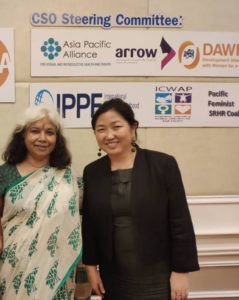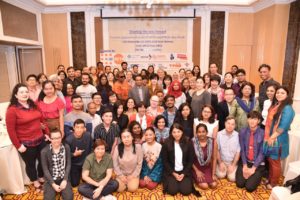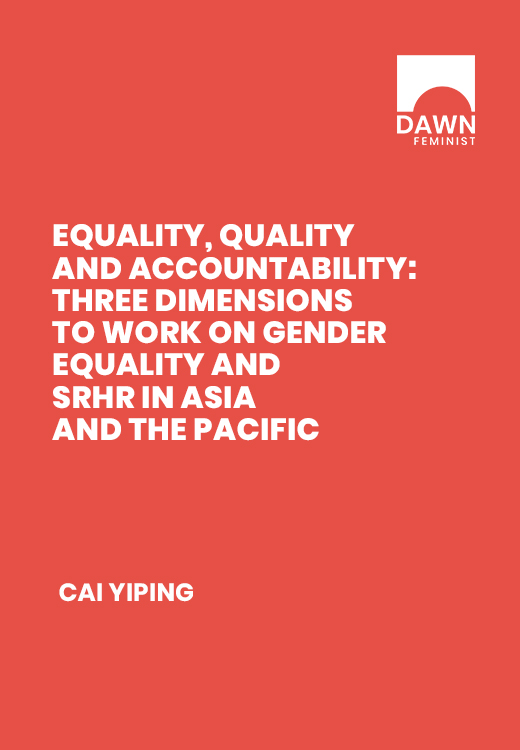
First situation: a pregnant woman living with HIV goes to the hospital to seek service on prevention of mother-child transmission. The doctor tells her they think that the right choice for her is not to give birth. The woman never returns to the health system. Second situation: a victim of domestic violence doesn’t tell the doctor the cause of the injuries she has, because the medical insurance would not cover the treatment. The State does not take responsibility for injuries inflicted by the husband who bit this woman.
Cai Yiping, Executive Committee member of Development Alternatives with Women for a New Era (DAWN), used these two situations to illustrate the challenges on operationalizing human-rights approach, and deepening work on the implementation of policies and principles concerning gender equality and Sexual and Reproductive Health and Rights (SRHR). Yiping spoke in a thematic panel “Advancing gender equality and universal access to SRHR” at the meeting for the Midterm Review of the Asian and Pacific Declaration on Population and Development, that took place in Bangkok from 26th to 28th of November at UN Economic and Social Commission for Asia and the Pacific (UNESCAP).
After 24 years of adoption of Programme of Action at the International Conference on Population and Development (ICPD) in Cairo and five years of the Asian and Pacific Ministerial Declaration on Population and Development in Bangkok, there have been many progresses achieved on poverty reduction, provision of universal health coverage, elimination of violence and discrimination against women and promotion of gender equality in Asia and the Pacific region; however, all these efforts have not reduced inequality, Yiping pointed out.
She proposed to use the framework of Equality, Quality and Accountability (EQA framework) developed by Dr. Gita Sen, general coordinator of DAWN, in her thematic paper for ICPD +20 review on human rights and further elaborated by the three country studies from China, India and Indonesia, as a starting point to guide the work on gender equality and SRHR. This framework can be helpful to address issues of justice and dignity, especially in the area of SRHR.
Concerning the first dimension of the framework, equality, Yiping highlighted that countries should focus their policies on the most deprived, marginalized and underrepresented sectors of their population: they can be tribal or indigenous population, migrants, young people, elder people, people with disabilities, people with different sexual orientation and gender identities, or any other groups.
She gave an example of China, that managed to reduce Maternal Mortality Ratio (MMR) by extending the health service to the most remote and poor rural areas, by providing financial resources and affirming its political commitments. By the end of 2015, the maternal mortality rate dropped further to about 20.1 of every 100,000 live births and currently, the urban and rural area difference is almost negligible.
The second dimension of EQA, quality, is extremely important, especially for SRH services, Yiping said. “Because it is about bodies, it is about the most private part of women’s bodies. Therefore, how does the health system treat these bodies? How do the service providers in the health system perceive the sexuality and bodies, how do they perceive gender roles?” Yiping asked.
The third dimension of EQA framework is accountability, a key point to reach equality and quality. Accountability mechanisms must be strong and participatory. We must review and repeal the laws and policies to ensure policy coherence and that “essential health care” is being provided to all, and that it meets the human rights criteria of availability, accessibility, acceptability and quality (AAAQ), without discrimination, cohesion and stigma. This applies, for example, to the situation of the woman who hesitates to tell the doctor the real cause of her injuries because medical insurance does not cover this kind of situations. “In the case of domestic violence maybe we should rethink this insurance policy, to make sure that those victims can have access to services”, Yiping pointed out.
It is also important to provide the adequate financial resources for public health and to regulate the health providers and financing on health, especially private financing. It would be crucial, in this sense, to establish a mechanism to monitor the implementation of the policies, laws, programs and initiatives, to monitor where and how the money were spent.
Yiping emphasizes that fulfilling gender equality requires not only political commitments but also sustainable financial resources and a strong accountability mechanism: “As the sexual and reproductive health services are inevitable through people’s lives, therefore, if we do not deal it now, we have to deal it later. If we fail to tackle its causes, then we have to address or readdress its consequences, this will be usually more expensive and more difficult in terms of high social and economic cost and at the high cost of wellbeing of people, and it will take longer period of time”.

However, these challenges can be turned into opportunities if countries work deeper on applying the rights-based approach, especially in the benefit of the most marginalized people, ensuring to leave no one behind.
The meeting was attended by the member states from Asia and the Pacific region, UN bodies and civil society organizations. As a regional input to the review and appraisal of the Programme of Action of the International Conference on Population and Development, the outcome of this meeting will be submitted to the Commission on Population and Development at its fifty-second session to be held in New York in April 2019.
Read the CSO Forum statement

